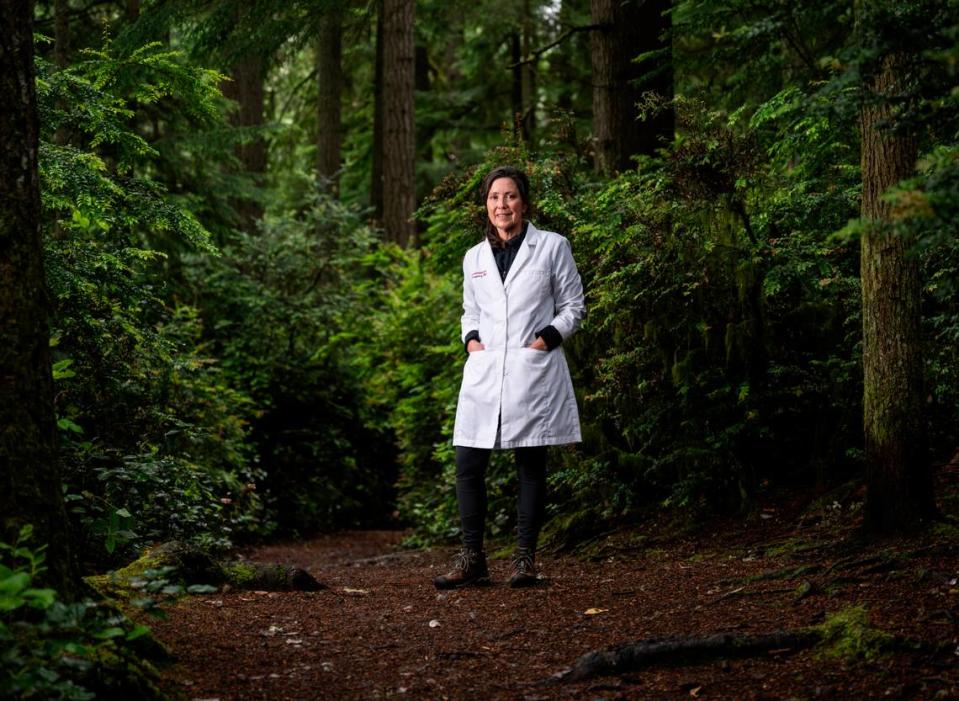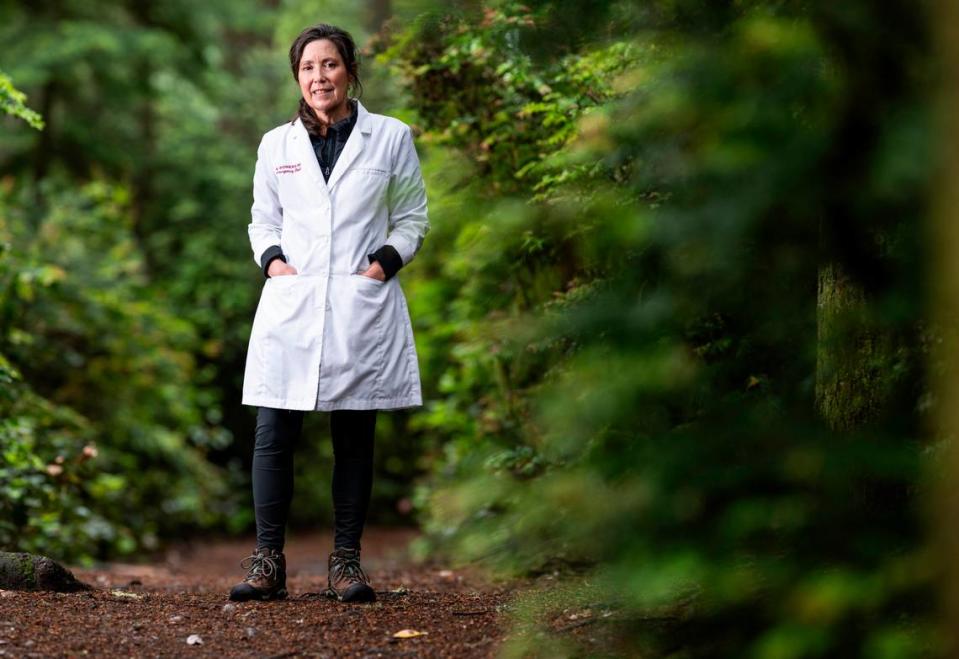Local woman named world expert in wilderness medicine. Here’s her advice on safe hiking
When she’s not working in the emergency room at St. Anthony Hospital in Gig Harbor, there’s a decent chance you’ll find Dr. Ann Bowers outdoors.
She climbed Mount Rainier a couple years ago. She snowboards, bikes and scuba dives. Backpacking, she said, is her “absolute favorite.”
Bowers is part of the Kitsap County chapter of Washington Explorer Search and Rescue and serves as a medical adviser for the Willamette Pass Ski Patrol in Oregon. She’s also one of the world’s foremost experts in wilderness medicine.
The Wilderness Medical Society honored her recently as one of the only people in the world to achieve the group’s “Triple Crown” designation.
“Dr. Bowers joins the inaugural group of recipients, with only six individuals in the world having achieved this recognition to date,” the society said in a news release earlier this year.

To receive the award, Bowers needed a Diploma in Diving & Marine Medicine, Diploma in Mountain Medicine, and Fellowship in the Academy of Wilderness Medicine.
“It’s quite involved,” Bowers told The News Tribune. “It takes a lot of time, and it takes physical stamina.”
Bowers said it’s not uncommon for people to take up to five years to complete any one of the three, let alone all of them. She started in 2018 and finished in 2023.
There are various conferences required, academic courses and experience in the field. For instance, she had to get trained and certified as a rescue diver, among other things.
The mountain medicine prong is probably the most strenuous, she said. The training involves practicing rope rescues on cliffs and crevasse rescues. Among other things, they simulate falling into a crevasse and have to perform a rescue while hanging in the air.
The idea to identify and honor those few who earn all three designations came about at the society’s conference in Spokane last year, Wilderness Medical Society spokesperson Kelly George told The News Tribune via email.
“A few additional recipients will be recognized this summer, but the Triple Crown will remain an honor bestowed upon less than .003% of our 4,000+ members worldwide,” George wrote. “Each one of these certifications is a tremendous accomplishment in itself, so to have all three truly is remarkable.”
The award is “a testament to their commitment to excellence and the highest standards of patient care in challenging environments,” WMS President Dr. Jennifer Dow said in the release.

Tragedy in the backcountry leads to training
It was about seven years ago that Bowers really got involved with the Wilderness Medical Society and started training others, she said.
She has two sons who are Eagle Scouts, ages 20 and 21, and she started teaching wilderness first aid to the scouting community.
There had been two deaths of scouts in the United States around that time, within a couple months of each other. She didn’t know either scout, but their deaths prompted her to get increasingly involved with wilderness-medicine training. She believes with the right training such deaths are avoidable.
One was due to an altitude illness.
“Unfortunately they were up there for a couple nights,” she said. “They didn’t really know what they were dealing with.”
The second death happened when a scout was caught in an extreme heat environment on an extended hike and suffered heat stroke.
“Better training would have prevented both of those deaths,” Bowers said.
Now she teaches a 16-hour course over two days to those who want to learn wilderness first-aid.
Wilderness preparedness and first-aid basics
Bowers said one of the key things is to understand the risks of the environment you’re going into and to make sure you have the right education and fitness for it. Extreme heat requires different preparedness than extreme cold, for instance.
“Know your limits,” Bowers said. “Make sure you train for what you’re going to be doing.”
She said having the right tools and knowing how and when to use them is important. Hikers need to carry the 10 essentials, she said, and she adds an 11th: communication devices. A phone, whistle, signal mirrors and beacons are options.
You need to know your water sources and to have basic survival techniques and navigation skills before heading out, she said.
If you do get lost, stay together as a group, build a shelter, and stay put, Bowers said. It’s harder for search crews to find you if you’re on the move.
The rule of threes is that you can generally survive three minutes without air, three hours without shelter in tough conditions, three days without water and three weeks without food.
“I think the more knowledge you have, the safer you are,” she said.
It’s important not to rely on one person in the group to have all the survival knowledge and tools, she said, in case something happens to that person. Everyone on a trip should have a personal first-aid kit.
She encourages hikers to start with a basic first-aid kit and add in what they find useful.
“Get familiar with blister bandages and make sure you have some,” she said.
Any water that’s treated to drink can be used to clean wounds, but hikers shouldn’t close wounds unless they’ve been trained how, she said. It’s easy to inadvertently seal in bacteria. A Ziploc bag with a puncture can be used to irrigate wounds, she said.
Hikers also need to know the types of wildlife they may encounter, what to do if that happens, and to practice enough to be prepared to act. An example: Having bear spray buried in a pack does no good. Having it on your hip, ready to quickly use, does.
Bowers cautioned that we live at sea level in the Puget Sound, which means sometimes we’re not prepared for the altitude change when we rapidly ascend mountains in the region. And we’re not always prepared for the snow and rapidly changing weather that we encounter.
“We don’t always appreciate that it’s not just a simple hike,” she said.
Correction: An earlier version of this article gave the wrong name for the Wilderness Medical Society. The story has been updated with the correct name.


